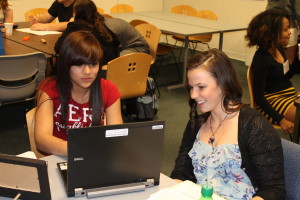Story by Chance Johnson
CSU’s Campus Corps youth mentoring program has received nearly $600,000 in funding from the William T. Grant Foundation to study the effectiveness of its distinctive approach to improving the lives of at-risk youth.
[caption id="attachment_10573" align="alignright" width="300"] A Campus Corps mentor, right, works with her youth mentee during a homework help session.[/caption]
Shelley Haddock, associate professor in the Department of Human Development and Family Studies, and Kimberly Henry, associate professor in the Department of Psychology, and colleagues will study one of the key components of the Campus Corps mentoring program: Mentor Families.
Campus Corps is a structured therapeutic mentoring program that matches trained CSU undergraduate student mentors with adolescents from Larimer County who are at risk for problem behaviors. The adolescents may struggle with delinquency, substance abuse, poverty, mental health problems, or family/social difficulties. Since 2010, more than 1,265 youth have received mentoring through the program, and preliminary evidence suggests that the program is effective at improving outcomes for participants. One youth mentee stated, “As the weeks went by, and I was staying clean and everything, I was like, I’m not such a bad person, maybe I have more of a purpose in life than just doing drugs.”
Mentors benefit too
The positive outcome of the program is not exclusive to the mentees, but also to the mentors.
“I was ready to drop out of college before joining Campus Corps,” one student mentor said, “and now, because of my time spent with the youth, I am excited about the possibility of pursuing an education degree.”
Henry explained how the new study will test a key component of Campus Corps: the Mentor Family.
“There is a base dyad (a group of two people) that consists of the mentor and mentee, this is akin to many mentoring programs across the country,” she said. “In Campus Corps, these dyads are embedded in what we call a Mentor Family.”
Four mentor-mentee dyads make up a Mentor Family. This leads to the primary research question: Does embedding mentor-mentee pairs in a Mentor Family lead to better outcomes?
“We have a conceptual model that demonstrates why we think Mentor Families will enhance the benefits of a traditional mentoring relationship,” Henry said. “Mentors will feel more supported and satisfied with their role – and will have a greater sense of self-efficacy. Therefore, they will be more capable to provide high-quality mentoring to the mentees.”
'Sense of belonging'
Henry attributes the success of Mentor Families to the fact that it makes participants feel like they belong to a group.
“Mentees will have a greater sense of belonging and mattering to others because they are part of this larger group; they will also have more opportunities to develop their social skills and broaden their social resources,” she said. “Ultimately, we posit that these improvements in the mentoring process will translate to better long-term outcomes for mentees; potentially decreasing depressive symptoms, improving academic outcomes, and decreasing delinquency.”
Haddock said that during each evening of the program, mentees pair off, taking part in a variety of productive activities.
“The program has the feel of a community to it,” Haddock said, “and is overseen by graduate students who are part of the Marriage and Family Therapy Program in HDFS.”
Haddock said there are various levels of resources available to the youth.
“A lot of these youth have difficult situations going on in their lives,” she said. “When they let the mentor know of an issue, the mentor can access the therapist, and then the mentee can meet with the therapist if needed.”
The evaluation process
Over the course of three years, the Campus Corps research team will randomly assign Campus Corps sessions (four per semester) to either a Mentor Family or no Mentor Family (traditional one-on-one mentoring). Program differences will be assessed via longitudinal surveys of mentors, mentees, and mentees’ caregivers; observations of mentors and mentees; and collection of official data such as academic achievement and recidivism. By the end of the study, the Campus Corps research team will determine if Mentor Families improve long-term outcomes for youth, and if they do, the mechanisms by which these improvements take place. This will have important implications for Campus Corps, as well as mentoring programs across the country.
Haddock developed Campus Corps along with Toni Zimmerman, a professor in HDFS, Jen Krafchick, a senior teaching assistant professor in HDFS, and Lindsey Weiler, an assistant professor in the Department of Family Social Sciences at the University of Minnesota.
Other researchers on the evaluation project include Weiler, Lise Youngblade, professor and head of HDFS and associate dean for research in the College of Health and Human Sciences; and Rachel Lucas Thompson, assistant professor in HDFS.
A Campus Corps mentor, right, works with her youth mentee during a homework help session.[/caption]
Shelley Haddock, associate professor in the Department of Human Development and Family Studies, and Kimberly Henry, associate professor in the Department of Psychology, and colleagues will study one of the key components of the Campus Corps mentoring program: Mentor Families.
Campus Corps is a structured therapeutic mentoring program that matches trained CSU undergraduate student mentors with adolescents from Larimer County who are at risk for problem behaviors. The adolescents may struggle with delinquency, substance abuse, poverty, mental health problems, or family/social difficulties. Since 2010, more than 1,265 youth have received mentoring through the program, and preliminary evidence suggests that the program is effective at improving outcomes for participants. One youth mentee stated, “As the weeks went by, and I was staying clean and everything, I was like, I’m not such a bad person, maybe I have more of a purpose in life than just doing drugs.”
Mentors benefit too
The positive outcome of the program is not exclusive to the mentees, but also to the mentors.
“I was ready to drop out of college before joining Campus Corps,” one student mentor said, “and now, because of my time spent with the youth, I am excited about the possibility of pursuing an education degree.”
Henry explained how the new study will test a key component of Campus Corps: the Mentor Family.
“There is a base dyad (a group of two people) that consists of the mentor and mentee, this is akin to many mentoring programs across the country,” she said. “In Campus Corps, these dyads are embedded in what we call a Mentor Family.”
Four mentor-mentee dyads make up a Mentor Family. This leads to the primary research question: Does embedding mentor-mentee pairs in a Mentor Family lead to better outcomes?
“We have a conceptual model that demonstrates why we think Mentor Families will enhance the benefits of a traditional mentoring relationship,” Henry said. “Mentors will feel more supported and satisfied with their role – and will have a greater sense of self-efficacy. Therefore, they will be more capable to provide high-quality mentoring to the mentees.”
'Sense of belonging'
Henry attributes the success of Mentor Families to the fact that it makes participants feel like they belong to a group.
“Mentees will have a greater sense of belonging and mattering to others because they are part of this larger group; they will also have more opportunities to develop their social skills and broaden their social resources,” she said. “Ultimately, we posit that these improvements in the mentoring process will translate to better long-term outcomes for mentees; potentially decreasing depressive symptoms, improving academic outcomes, and decreasing delinquency.”
Haddock said that during each evening of the program, mentees pair off, taking part in a variety of productive activities.
“The program has the feel of a community to it,” Haddock said, “and is overseen by graduate students who are part of the Marriage and Family Therapy Program in HDFS.”
Haddock said there are various levels of resources available to the youth.
“A lot of these youth have difficult situations going on in their lives,” she said. “When they let the mentor know of an issue, the mentor can access the therapist, and then the mentee can meet with the therapist if needed.”
The evaluation process
Over the course of three years, the Campus Corps research team will randomly assign Campus Corps sessions (four per semester) to either a Mentor Family or no Mentor Family (traditional one-on-one mentoring). Program differences will be assessed via longitudinal surveys of mentors, mentees, and mentees’ caregivers; observations of mentors and mentees; and collection of official data such as academic achievement and recidivism. By the end of the study, the Campus Corps research team will determine if Mentor Families improve long-term outcomes for youth, and if they do, the mechanisms by which these improvements take place. This will have important implications for Campus Corps, as well as mentoring programs across the country.
Haddock developed Campus Corps along with Toni Zimmerman, a professor in HDFS, Jen Krafchick, a senior teaching assistant professor in HDFS, and Lindsey Weiler, an assistant professor in the Department of Family Social Sciences at the University of Minnesota.
Other researchers on the evaluation project include Weiler, Lise Youngblade, professor and head of HDFS and associate dean for research in the College of Health and Human Sciences; and Rachel Lucas Thompson, assistant professor in HDFS.
Read More
 A Campus Corps mentor, right, works with her youth mentee during a homework help session.[/caption]
Shelley Haddock, associate professor in the
A Campus Corps mentor, right, works with her youth mentee during a homework help session.[/caption]
Shelley Haddock, associate professor in the  Colorado State University has launched a new website with resources and tips on how to lead a healthy lifestyle — and stay true to those new year’s resolutions.
The site, called “Live Eat Play,” includes information on exercise and various diets, cooking tips, health foods and maintaining a good work/life balance. A collaboration among
Colorado State University has launched a new website with resources and tips on how to lead a healthy lifestyle — and stay true to those new year’s resolutions.
The site, called “Live Eat Play,” includes information on exercise and various diets, cooking tips, health foods and maintaining a good work/life balance. A collaboration among